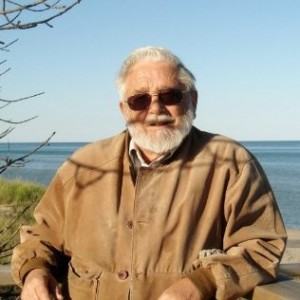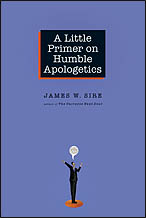
James W. Sire digs deeper into Micheal Hickerson‘s Worldview question:
How can we find common ground when someone has a radically different worldview from our own?
In the previous blog post, I argued that as Christians we know that we share a common ground with all people in that we are all created in the image of God to live in a universe created by a loving, righteous, infinite-personal God. I also said that we agree to and use the universal laws of logic (A is A; A is not not-A; and B is either A or not- A). I called this our common ontological ground and minimally common epistemological ground.
But a fully common ground for our communication and our understanding of each other and the world around us requires more than these necessary laws of thought. It requires a common set of basic assumptions. Here are some of them: This universe in which we live has a determinate (not necessarily determined) objective existence other than ourselves and our thoughts (Theists and naturalists agree; Hindus and some Western philosophies deny this). Each of us is one person who is different from other persons and other things in the universe (a notion held by theists, deists and naturalists, but not by Hindus, Buddhists or New Agers). Our minds are capable of knowing something about who we are and what the universe is; we can trust our reason, though we recognize that it has limits in both its scope and its capacity (Theism, deism, naturalism agree; Hinduism and Buddhism reject this). There is a God who is Infinite and Personal, the good Creator of the universe and the one to whom we are responsible (Theists agree; naturalists, New Agers, Hindus, Buddhists disagree). Other necessary assumptions concern morality; the meaning, if any, of the flow of history; the meaning and value, if any, of individual human lives. All of these are understood in different and contradictory ways. Moreover there are different versions of theism —Judaism, Christianity and Islam, to name the big three.
Is there any common ground among these many worldviews, i.e., ground basic enough to undergird convincing arguments for the truth of the Christian faith? I think the answer is No.
Does this mean that we pay no attention to rational apologetics? Must we simply testify, announce, proclaim and let the words fall where they may? No, I don’t quite think that either.
There are better and worse ways to proclaim the gospel. Reasoned argument, amassing of evidence, articulate personal witness to the truth of the gospel are better than erratic, garbled, true but mystifying pronouncements or outright arrogant, aggressive and offensive comments.
In the apologetic practice, which I described in Part I, I paid no attention to a theoretical explanation of why common ground could or could not be found. In practice, I know it can. The proof lies there. Every time people become Christians they shift from one ground common to their former worldview to a ground common among Christians. So what then can we do? I suggest we view our apologetic task this way.
Christian apologetics lays before the watching world such a winsome embodiment of the Christian faith that for any and all who are willing to observe there will be an intellectually and emotionally credible witness to its fundamental truth.
Embody the Christian faith by what we do and say. That reveals the ground of the Christian faith. Pray for those who yet do not see God in Christ reconciling the world to himself. The Lord will open the eyes —the mind and heart —of those he calls to a full and genuine Christian faith.
To sum it all up. Jesus teaches his disciples to become fishers of men and women. So, go fish.

Note: The above definition of apologetics comes from the first chapter of my A Little Primer on Humble Apologetics (InterVarsity Press, 2006) and is based on an argument from Scripture. The Wikipedia entry on Presuppositional Apologetics comments: “An implication of this [theologian John Frame’s] position is that all arguments are ‘person relative’ in the sense that one non-Christian might be persuaded by a particular argument and another might not be, depending on their background and experiences; even if the argument constitutes logically valid proof.” For a good summary of the various theological explanations of common ground in apologetics, see Wikipedia’s entry for Presuppositional Apologetics.
———————————————————————–
Thank-you! to Mike for posing the question. Thank-you! to Jim for his two part response. If you’re a reader and desire to dig into the question further or ask another question, please reply to the blog post or email Tom. If you desire, we are more than willing to attribute the question to “Anonymous.”
A few follow-up questions for your consideration (personally or as part of a discussion):
* How have you wrestled with common ground across worldviews? How have you or have you not found it?
* Do you agree/disagree that there is a place for rational apologetics and if so, how do you describe your use of rational apologetics?
* When the next opportunity arises, how will you give testimony to and an argument for what it means to embody the Christian faith with head, heart, and hands in the context of higher education? Note: Personally I’m preparing for a number of holiday social inquiries by friends, family, and those with whom I labor.
Note: Click here for other ESN blog posts by Jim Sire, including excerpts from his autobiography Rim of the Sandhills.
Update profile picture/caption. 11/12/2012. 11:21PM CST.
Tom enjoys daily conversations regarding living out the Biblical Story with his wife Theresa and their four girls, around the block, at Elizabethtown Brethren in Christ Church (where he teaches adult electives and co-leads a small group), among healthcare professionals as the Northeast Regional Director for the Christian Medical & Dental Associations (CMDA), and in higher ed as a volunteer with the Emerging Scholars Network (ESN). For a number of years, the Christian Medical Society / CMDA at Penn State College of Medicine was the hub of his ministry with CMDA. Note: Tom served with InterVarsity Christian Fellowship / USA for 20+ years, including 6+ years as the Associate Director of ESN. He has written for the ESN blog from its launch in August 2008. He has studied Biology (B.S.), Higher Education (M.A.), Spiritual Direction (Certificate), Spiritual Formation (M.A.R.), Ministry to Emerging Generations (D.Min.). To God be the glory!

Leave a Reply